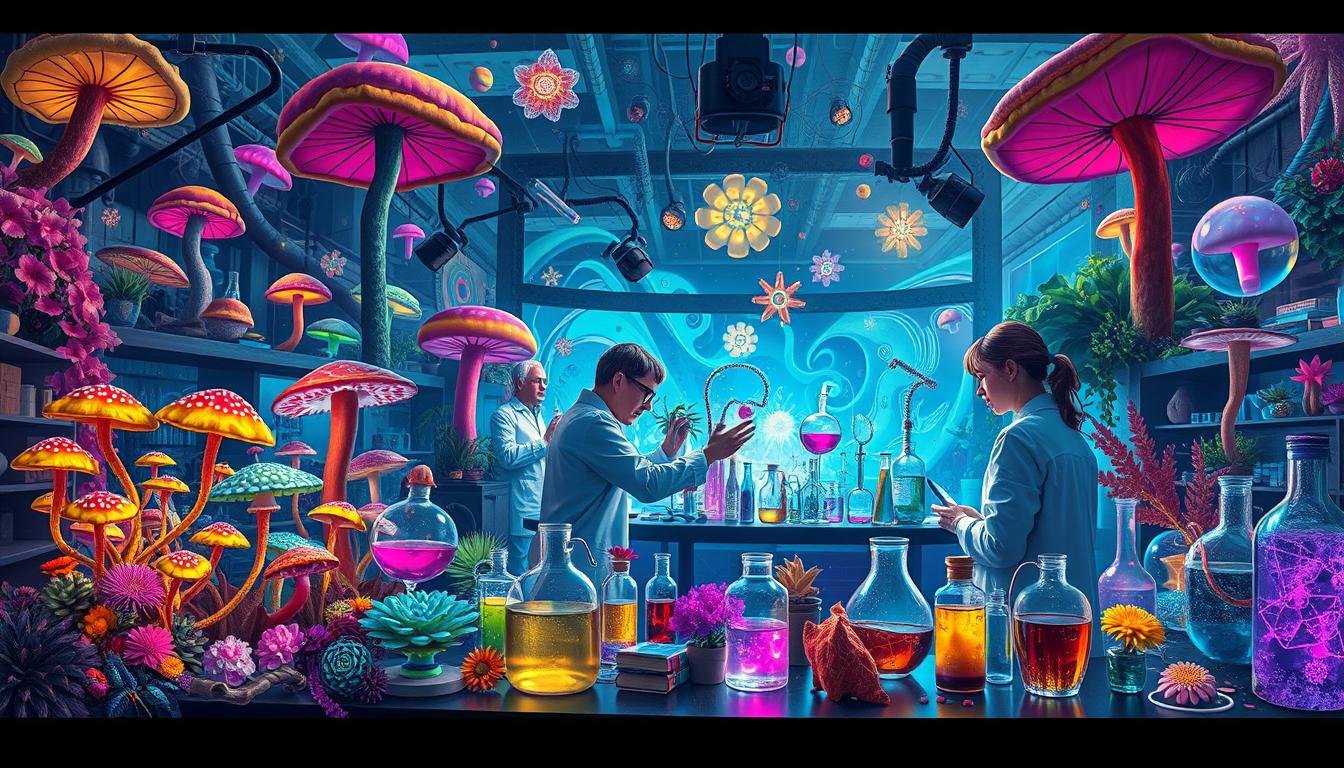Global Trends in Psychedelics: What the Future Holds

Psychedelic research is booming, with studies looking into their medical uses. The future of psychedelics seems bright, thanks to ongoing research. As we explore psychedelics, it’s clear that research is key to their future.
More people are interested in using psychedelics for health reasons. This interest has led to more funding for research. This funding is helping us learn more about the benefits and risks of these substances. It’s important to keep up with the latest research on psychedelics.
Introduction to Psychedelic Trends
Psychedelics are becoming more popular, sparking talks about their benefits and risks. As we look at global trends in psychedelics, it’s clear that research will shape their future. The future of psychedelics is promising, and staying updated on research is crucial.
Key Takeaways
- The future of psychedelics is closely tied to the advancements in psychedelic research.
- Investment in psychedelic research is on the rise, leading to new discoveries and a deeper understanding of these substances.
- Psychedelics have the potential to revolutionize the field of mental health treatment.
- Ongoing research is exploring the potential benefits and risks associated with psychedelics.
- The growing interest in psychedelics has led to increased discussions about their potential benefits and risks.
- Psychedelic research has the potential to unlock new treatments for various mental health conditions.
The Current State of Global Psychedelic Research
Psychedelic research is booming worldwide, with many institutions diving into the field. These places are key to unlocking the secrets of psychedelics and their healing powers.
Top research spots are working hard to find out if psychedelics can help with mental health issues. Their work is vital for the future of psychedelic research and for making laws about these substances.
Leading Research Institutions and Their Focus Areas
- Johns Hopkins University: Psilocybin research for depression and anxiety
- Imperial College London: Psychedelic research for mental health and addiction
- University of California, Los Angeles (UCLA): Studies on MDMA-assisted therapy for PTSD
Breakthrough Studies and Their Implications
Recent studies show psychedelics might help with mental health problems. For instance, a study on psilocybin for depression showed big improvements. These results are exciting for creating new treatments and for the future of research.
Investment in Psychedelic Research
More money is going into psychedelic research, thanks to organizations and governments. This funding is essential for moving the field forward and making sure research is done right.
| Research Institution | Focus Area | Breakthrough Studies |
|---|---|---|
| Johns Hopkins University | Psilocybin research | Psilocybin-assisted therapy for depression |
| Imperial College London | Psychedelic research | Psychedelic-assisted therapy for mental health |
| University of California, Los Angeles (UCLA) | MDMA-assisted therapy | MDMA-assisted therapy for PTSD |
Medical Applications Driving Industry Growth
The use of psychedelics in medicine is growing fast. This is because more medical conditions are being treated with these substances. These include mental health issues like depression, anxiety, and PTSD.
Some of the main uses of psychedelics in medicine are:
- Treatment of mental health disorders, such as depression and anxiety
- Pain management and palliative care
- Treatment of addiction and substance abuse
As research finds more ways psychedelics can help, we’ll see even more uses. This will keep the industry growing. Experts believe psychedelics will change how we treat mental health in the future.
Emerging Global Trends in Psychedelics and Their Impact
We are seeing big changes in the world of psychedelics. Emerging trends are changing how we treat mental health. One exciting area is using psychedelics to fight treatment-resistant depression.
Studies show psychedelics can help with depression. Even those who didn’t get better with usual treatments are seeing improvements. This makes many people think psychedelics could be a game-changer for depression.
Breakthroughs in Treatment-Resistant Depression
- Studies have shown psychedelics can reduce depression symptoms
- Patients are feeling better and enjoying life more
- More research is needed to fully understand psychedelics’ effects on depression
As we dive deeper into psychedelics, it’s key to watch the emerging trends and their effects on mental health. By keeping up with this research, we can find new ways to help people with treatment-resistant depression.
| Condition | Treatment | Outcome |
|---|---|---|
| Treatment-Resistant Depression | Psychedelics | Significant reduction in symptoms |
| PTSD | Psychedelics | Improved mental health and well-being |
| Addiction | Psychedelics | Promising results in reducing addiction rates |
Legal Framework Evolution Worldwide
We’re seeing big changes in how the law treats psychedelics. More countries are making laws to allow psychedelics. This change comes from new research showing psychedelics can help people, and more people learning about their benefits.
Looking at countries leading in regulatory changes, we see a new era starting. Countries like:
- Portugal, where using psychedelics is no longer a crime
- Canada, where psilocybin is approved for medical use
- The United States, where some states allow psychedelics for health reasons
These regulatory changes are changing the game. They let researchers study and doctors treat with psychedelics. As laws keep changing, we’ll see more progress in psychedelic medicine.
These changes will affect many areas, not just medicine. They will also touch education and how we see the world. It’s important to think about how legalization of psychedelics and regulatory changes will shape our future.
| Country | Legal Status | Therapeutic Uses |
|---|---|---|
| Portugal | Decriminalized | Research and development |
| Canada | Approved for therapeutic use | Treatment of mental health disorders |
| United States | Legalized in some states | Treatment of mental health disorders and addiction |
The Rise of Psychedelic Therapy Centers
We’re seeing more psychedelic therapy centers popping up worldwide. This is helping make psychedelics more accepted for treating mental health issues. These centers offer a safe place for people to try psychedelic therapy. It’s shown to help with depression, anxiety, and PTSD.
The need for new mental health treatments is driving this growth. Many people have had good experiences with psychedelic therapy. This has led to more people talking about it and more centers opening up. Countries where psychedelics are legal for medical use are seeing the most growth.
- Experienced therapists and medical professionals
- A safe and controlled environment for therapy sessions
- Access to a range of psychedelic substances, including psilocybin and MDMA
- Integrative treatment approaches, combining psychedelic therapy with other forms of therapy
As more people look for psychedelic therapy centers, we’ll see more progress in mental health care. With more centers opening, we’re getting closer to offering new, effective treatments for mental health issues.
| Psychedelic Therapy Center | Location | Services Offered |
|---|---|---|
| Center for Psychedelic Therapy | New York, USA | Psilocybin-assisted therapy, MDMA-assisted therapy |
| Psychedelic Research Institute | London, UK | Psilocybin-assisted therapy, ketamine-assisted therapy |
Investment Landscape and Market Projections
We’re seeing a big jump in investment in psychedelics. Major players and leaders are popping up everywhere. Looking at the investment scene, market projections are key to seeing the industry’s future.
The market is growing fast, thanks to venture capital. Some big names in the field are:
- Compass Pathways
- Field Trip Health
- MAPS Public Benefit Corporation
Recent data shows promising growth forecasts. By 2030, the industry is expected to soar. Here’s a table showing the expected growth:
| Year | Growth Rate | Market Size |
|---|---|---|
| 2024 | 15% | $1.5 billion |
| 2025 | 20% | $2.5 billion |
| 2030 | 30% | $10 billion |

Looking ahead, market projections and investment in psychedelics are crucial. With smart investments and understanding market trends, we can unlock the psychedelics industry’s potential. This will lead to a better future for mental health treatment.
Indigenous Knowledge Integration in Modern Applications
We see how important indigenous knowledge is in today’s use of psychedelics. By using traditional practices, we can make therapy better and more respectful. For centuries, indigenous knowledge has helped people heal and feel better. Adding it to modern therapy is a big step.
Using indigenous knowledge in psychedelic therapy is getting more attention. This can happen in many ways, like:
- Working with indigenous groups to make treatments that fit their culture
- Using traditional plants in new therapies
- Adapting spiritual practices to help with psychedelic therapy
As we go forward, we must respect and work with indigenous communities. This way, we can use their knowledge wisely and with respect.
Adding indigenous knowledge to psychedelic therapy can make treatments better. It helps us understand the cultural and spiritual sides of using psychedelics. As we keep exploring psychedelics, we should always include indigenous knowledge and views.
Technological Innovations in Psychedelic Medicine
We’re seeing big changes in psychedelic medicine thanks to new tech. These changes are making mental health treatments better and more tailored to each person.
New tech in psychedelic medicine is making these treatments more accessible and effective. For example, digital health tools help create personalized plans and track progress in real-time.
Digital Health Integration
Digital health is a big part of the tech changes in psychedelic medicine. It uses apps, wearables, and electronic health records to monitor and give feedback to patients.
Novel Delivery Methods
New ways to give psychedelic medicines are being developed. Things like transdermal patches and inhalers aim to make treatments safer and more appealing to patients.
Biosynthesis Developments
Biosynthesis is also key in making psychedelic medicines. It uses microorganisms to produce these drugs, making them cheaper and more available.
As tech keeps advancing, we’ll see even better treatments for mental health. New tech is helping make psychedelic medicines more effective and tailored to each person’s needs.
Public Perception and Cultural Shift
We are seeing a big change in how people view psychedelics. This change comes from more media coverage and educational efforts. These efforts aim to teach the public and show a clearer picture of psychedelics.
Media has been key in changing how we see psychedelics. Many news outlets now share balanced reports on their benefits and risks. This has helped lower stigma and raise awareness, leading to a cultural shift.

- Increased research and studies on the therapeutic potential of psychedelics
- Growing public interest and demand for alternative treatments
- Expanding educational initiatives and awareness campaigns
As views on psychedelics change, it’s vital to keep discussions balanced and informed. This way, we can better understand these substances. It helps us see their benefits and risks, leading to a more informed cultural shift.
| Factor | Impact on Public Perception |
|---|---|
| Media Coverage | Increased awareness and reduced stigma |
| Education and Research | Improved understanding of therapeutic potential |
| Public Interest and Demand | Growing acceptance and demand for alternative treatments |
Sustainability and Ethical Considerations
We understand the big role sustainability plays in making psychedelics. It affects our environment and the world around us. The psychedelic industry needs to use green practices to lessen its harm on the planet.
Looking at ethical considerations, we must focus on fairness and respect. This means making sure everyone has access to psychedelics. It also means protecting the knowledge and rights of indigenous peoples.
Important points for sustainability and ethical considerations include:
- How psychedelics affect the environment
- Ensuring everyone can get psychedelics
- Keeping indigenous knowledge safe and involved
By focusing on sustainability and ethical considerations, we can make sure the psychedelic industry grows right. It should be fair and good for the planet.
| Factor | Importance | Current Status |
|---|---|---|
| Environmental impact | High | Variable |
| Access and equity | High | Limited |
| Indigenous knowledge protection | High | Inadequate |
Professional Training and Certification Developments
We know how key professional training and certification are in psychedelics. As the field expands, it’s vital for therapists to get the right education. This ensures they can offer top-notch care.
Training programs are being set up to meet this need. They focus on using psychedelics safely and effectively in therapy. These programs include classes, workshops, and hands-on training.
They cover topics like psychedelic-assisted therapy, how to assess patients, and planning treatments. By getting professional training, therapists can better work with patients. Getting certified also shows they’re committed to quality care.
Therapist Training Programs
Therapist training programs aim to give a deep education in psychedelic-assisted therapy. They might include:
- Foundational courses in psychology and psychiatry
- Training in psychedelic-assisted therapy models
- Practicum or internship experience
- Ongoing supervision and support
Accreditation Standards
Accreditation standards are being set to make sure training programs meet certain levels. These standards might include:
- Curriculum requirements
- Faculty qualifications
- Clinical training and supervision
- Evaluation and assessment methods
By focusing on professional training and certification, we can make sure therapists are ready to give great care. This will help the industry grow and improve patient results.
Conclusion: Shaping the Future of Mental Health Treatment
The future of mental health treatment looks bright with psychedelics. Research and trends show great promise. They could change how we treat mental health issues like depression, PTSD, and addiction.
Understanding psychedelics better can make mental health care better. We need to work together to make this happen. This includes researchers, doctors, policymakers, and the community.
We must keep safety and care at the top when using psychedelics. We also need to respect their cultural history. By doing this, we can help people and make society better.
FAQ
What are the leading research institutions focusing on in the field of psychedelics?
Top research places worldwide are studying psychedelics. They look at how substances like psilocybin, MDMA, and LSD can help with depression, PTSD, and addiction.
What are some of the recent breakthrough studies in psychedelic research and their implications?
New studies show psychedelics might help with mental health issues. For example, psilocybin could help with depression, and MDMA might treat PTSD.
How is the investment landscape shaping the growth of the psychedelics industry?
Big money is flowing into psychedelics, from venture capital to pharma companies. This money funds more research and helps grow the industry fast.
What are some of the emerging global trends in the use of psychedelics for medical applications?
Trends show psychedelics being used for depression, PTSD, and addiction. Researchers are hopeful they can offer lasting relief for these conditions.
How are countries around the world evolving their legal frameworks regarding psychedelics?
Laws on psychedelics are changing, with Canada, the Netherlands, and the U.S. leading. They’re moving towards allowing medical use and creating rules for it.
What role are psychedelic therapy centers playing in the mainstream acceptance of these substances?
Therapy centers are key in making psychedelics accepted for mental health. They offer safe therapy, showing the benefits of these substances.
How are technological innovations transforming the field of psychedelic medicine?
Tech is changing psychedelic medicine a lot. It’s improving health tools, delivery methods, and making production better. This opens up more uses for psychedelics.
How is the public perception and cultural shift towards psychedelics shaping the industry?
People are starting to see psychedelics in a new light, thanks to media and education. This change helps the industry grow and evolve.
What sustainability and ethical considerations are being addressed in the psychedelics industry?
The industry is facing big questions on sustainability and ethics. It’s looking at the environmental impact, making treatments accessible, and respecting indigenous knowledge.
What professional training and certification developments are emerging in the field of psychedelic therapy?
Psychedelic therapy is getting its own training and standards. This ensures therapists are well-trained and professional in their work.

